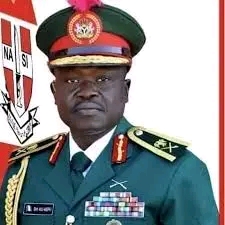By Abdul Lauya
Retired Major General Danjuma Ali-Keffi has made explosive claims about retaliation he faced after leading a successful anti-terror operation.
In a letter addressed to President Bola Ahmed Tinubu, Ali-Keffi detailed a disturbing sequence of events following what he described as a major breakthrough in the fight against Boko Haram.
According to him, after capturing the “real leader” of the terrorist group, he was forced into retirement, arrested, and held in solitary confinement for 64 days.
Ali-Keffi once led the Nigerian Army’s 1 Division and was appointed to head “Operation Service Wide,” a high-level counter-terror task force sanctioned by the presidency.
He said the team uncovered not only top Boko Haram commanders but also a web of terror financiers—including officials in government, the military, and the banking sector.
“The moment we arrested some of these individuals and started exposing the financial pipelines of terror, the backlash began,” he wrote.
He alleged that powerful figures swiftly moved to shut down the operation and silence those involved.
Ali-Keffi also raised fresh questions over the 2021 death of Lt. Gen. Ibrahim Attahiru, Nigeria’s former Chief of Army Staff.
He claimed Attahiru had supported the mission and was determined to dismantle terror funding networks before dying in a plane crash.
The retired general hinted the crash may not have been an accident and urged a fresh investigation into both the incident and broader sabotage of anti-terror efforts.
His testimony has sparked renewed calls for transparency and accountability in Nigeria’s war against insurgency.
So far, the federal government has not issued an official response.
If true, Ali-Keffi’s claims suggest an entrenched system where counter-terrorism is sabotaged from within.
Instead of recognition, those fighting terror may be facing retribution from the very institutions meant to protect them.
The general’s revelations raise troubling questions about who truly benefits from ongoing insecurity—and who is being silenced for challenging it.
Until those questions are answered, Nigeria’s fight against terrorism may be undermined not by its enemies, but by betrayal within.
For advert placement and inquiries, publication of press releases, and news coverages, please call: Phone: 08052898434 Email: editor@eyereporters.com, click here to view the advert rates.



